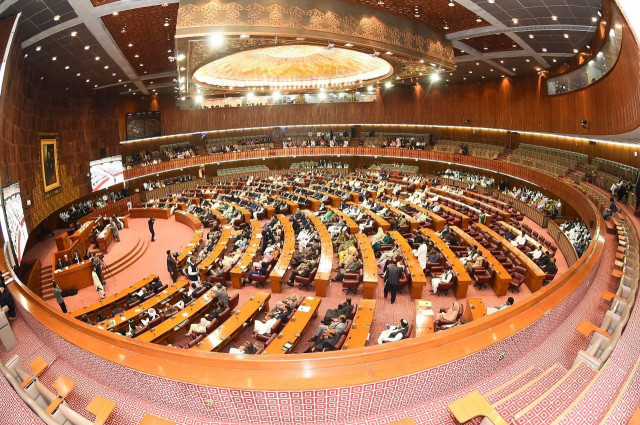Govt passes key bills sans debate in NA
Establishes Rs100tr worth of sovereign fund termed as 'financial life of Pakistan'

Billing it as ‘the financial life of the country’, the National Assembly on Monday passed the Sovereign Wealth Fund Act, 2023 without any debate as the legislation sailed through the house with the help of a handful of lawmakers who were present as well as those who were absent, playing the role of a rubber stamp.
The lower house of parliament passed several other key bills by skipping any debate.
To add insult to injury, Federal Law Minister Senator Azam Nazir Tarar argued in an almost empty house that as the coalition government’s federal cabinet already discussed the bills concerned at length, the objections raised by JUI-F’s Aliya Kamran that the bills must be referred to the committees concerned before they were passed shouldn’t halt the process of passing the bills.
“Are we a rubberstamp?” questioned Aliya. “If the bills have been discussed in the cabinet, then what are we?”
The lawmaker argued that the members of her party might have given approval in the cabinet but its copy was not provided to the lawmakers, asking how one should give vote in favour of the bill when it had not been read by the person concerned.
Even Education Minister Rana Tanveer agreed with Aliya that a copy of the bill should have been provided to the lawmakers but urged her to give consent for a minor change in one of the bills that he presented.
Through the bill, the Pakistan Sovereign Wealth Fund “stands established” which shall be owned and controlled by the federal government.
“The authorised capital of the fund shall be one hundred trillion rupees and its issued capital shall be paid in cash or in kind by the federal government,” the bill read, adding the issued capital might be increased.
The objective of the fund is to contribute to sustainable economic development through the management of its funds and assets and achieving optimal use of them according to the best international standards and policies to maximise their value for the future generations.
“This purpose may be achieved through the cooperation and participation with counterpart funds or other financial institutions or any of them on a commercial basis to achieve the return determined by the investment policy of the fund,” it read.
Schedule I of the bill carries the details of the assets and entities that have been transferred to the fund.
So far, a total of seven companies and government shares estimated to have a net worth of Rs2.3 trillion in them have been transferred for raising funds through the sale of shares and using their earnings for capital investments.
They include Oil and Gas Development Company Limited with its 3,657,079,419 shares; Pakistan Petroleum Limited with its 1,952,181,498 shares; National Bank of Pakistan with 1,608,420,866 shares; Government Holdings (Private) Limited with 2,088,512,092 shares; Pakistan Development Fund Limited with 6,000,000,000 shares; Mari Petroleum Company Limited with 24,532,720 and the Neelum-Jhelum Hydro-Power Company (Private) Limited with 416,634,630 shares.
According to the Statement of Objectives and Reasons, the bill intends to enact the law regarding the establishment of a state-owned sovereign wealth fund. Internationally, it said, the primary functions of sovereign wealth funds are to stabilise the country’s economy through diversification and to generate wealth for future generations.
The size and number of sovereign wealth funds continue to increase suggesting that these funds will remain a crucial part of the world economy in the future.
The bill states that the most important objectives of the fund are the diversification and broadening of Pakistan’s economy, attracting co-investment from other investors for developmental projects in the country, creating investment models which promote economic growth and infrastructure development in Pakistan and increasing savings for the future generations.
The bill addresses all matters pertaining to the establishment, operations, and management of the fund.
In order to ensure proper control of the fund, the bill makes it mandatory that all major decisions, including investment mandate, are to be made with the approval of the supervisory council, the prime minister being its chairman and finance and planning ministers its members.
Further, it read that the accounts of the fund shall be audited by at least one auditor of international repute. In order to accelerate economic growth and fulfil the requirement of infrastructure development in the country, there is a need to make this law for the establishment of the fund.
“It is hoped that the fund would likely decrease the dependence on government's resources for capital formation for long-term developmental projects,” it concluded.
The new sovereign fund is exempted from three core laws: the Privatisation Commission Ordinance 2000, the Public Procurement Regulatory Authority Ordinance 2002, and the State-Owned Enterprises (SOE) Act, 2023, to make it investor-friendly.
BoI bill passed
Apart from the bill related to sovereign fund, the National Assembly passed the Board of Investment (Amendment) Act, 2023, through which the federal government shall establish a Special Investment Facilitation Council (SIFC) – a hybrid civil-military forum, which the government set up to actualise the Economic Revival Plan.
The country’s top civil-military leadership had earlier presented the ‘Economic Revival Plan’ – claimed to be a bigger economic project than the China-Pakistan Economic Corridor (CPEC) – to address the nation’s economic struggles by harnessing the country’s untapped potential in key sectors through local development and foreign investments.
To attract investment in different sectors from Gulf countries and to expedite project implementation, the government had established the SIFC, which will serve as a streamlined interface for investors and remove all the bottlenecks in investments with the help of the army.
The bill says that the SIFC shall facilitate investment and privatisation in areas, including but not limited to defence, agriculture, infrastructure development, strategic initiatives, logistics, minerals, information technology, telecommunication and energy, adding that it shall take all the measures to facilitate and promote opportunities for investment and business in and for Pakistan.
The SIFC will act as a ‘single window’ for multi-domain cooperation in relevant fields with GCC countries in particular, and other countries in general, for the facilitation of investment and development of an enabling policy environment.
Army bill passed
Also, the assembly passed the Pakistan Army (Amendment) Act, 2023, on the heels of it being passed by the Senate.
The army bill gives vast powers to Pakistan Army beyond its original mandate through a series of amendments in the Pak Army Act of 1952 which, if signed by the president, would legitimise the GHQ’s role in carrying out activities otherwise considered the prerogative of civilian authorities.
Apart from proposing to increase Pakistan Army’s mandate, the bill provides legal cover to the army’s unbridled activities in the economic domain under the ‘welfare through affiliated entities’ clause, which allows the army through its affiliated entities to carry out activities that relate to or generate proceeds for, inter alia, welfare and rehabilitation of serving, retired, wounded, and families of the martyrs of army personnel.
Both the things in the army act, among several other amendments describing the punishment for leaking secret information as well as imposing restrictions on joining politics or employment after the army’s job, have been given retrospective effect as sections 175-D (welfare through affiliated entities) and 175-E (national development) state that “all such activities already undertaken shall always be deemed to have been validly done under this act”.
Other bills
Among other bills, with a total of nine lawmakers and two senators – Tarar and Shahdat Awan, the assembly passed the Defence Housing Authority Islamabad (Amendment) Bill, 2023; the Federal Urdu University of Arts, Sciences and Technology, Islamabad (Amendment) Bill, 2023; and the Cantonments (Amendment) Bill, 2023.



















COMMENTS
Comments are moderated and generally will be posted if they are on-topic and not abusive.
For more information, please see our Comments FAQ